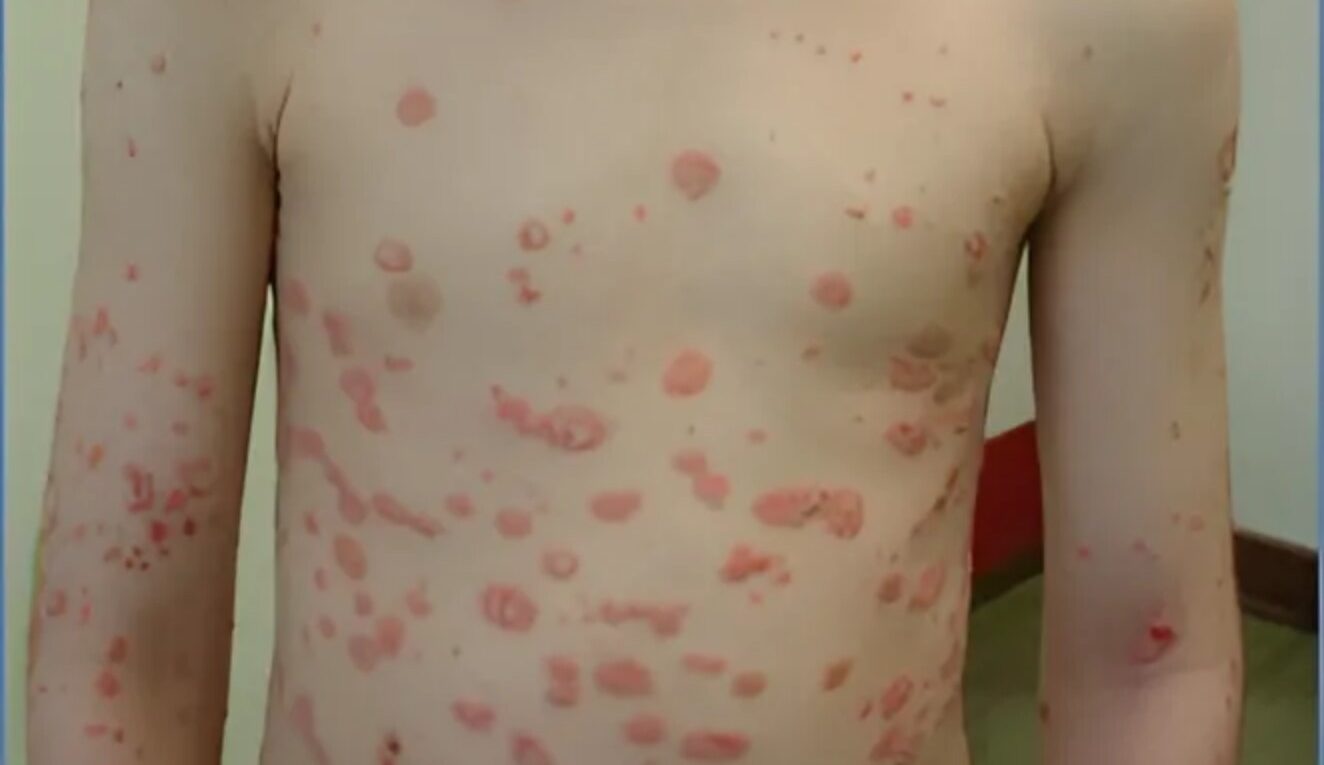Click here to Visit Facebook Page
Psoriasis is a chronic autoimmune condition that affects millions of people worldwide. While it’s commonly associated with adults, it can also manifest in children, albeit less frequently. Pediatric psoriasis presents unique challenges and considerations for both patients and caregivers. In this blog, we’ll delve into the specifics of pediatric psoriasis, covering its symptoms, causes, diagnosis, and treatment options.
Understanding Pediatric Psoriasis
Psoriasis is characterized by the rapid overproduction of skin cells, leading to the formation of thick, red, scaly patches on the skin’s surface. In children, this condition can manifest similarly to adults but may present with some distinct differences.
Symptoms of Pediatric Psoriasis
The symptoms of pediatric psoriasis can vary widely from child to child. However, common symptoms include:
1. Red, raised patches of skin covered with silvery scales
2. Itching or burning sensations
3. Dry, cracked skin that may bleed
4. Nail changes, such as pitting or separation from the nail bed
5. Joint pain or swelling (in some cases)
It’s essential to note that symptoms may come and go in cycles, with periods of flare-ups followed by periods of remission.
Click here to Visit Facebook Page
Causes of Pediatric Psoriasis
The exact cause of psoriasis remains unknown, but it’s believed to be a combination of genetic and environmental factors. In children, certain triggers may exacerbate symptoms, including:
1. Infections: Strep throat and other bacterial or viral infections can trigger psoriasis flare-ups.
2. Stress: Emotional stress or trauma can worsen symptoms in susceptible individuals.
3. Injury to the skin: Physical trauma, such as cuts, scrapes, or sunburn, can trigger psoriasis lesions.
4. Medications: Some medications, including lithium, beta-blockers, and antimalarial drugs, may exacerbate psoriasis symptoms in children.
Diagnosing Pediatric Psoriasis
Diagnosing psoriasis in children can be challenging, as it may resemble other skin conditions like eczema. A dermatologist will typically conduct a physical examination and review the child’s medical history. In some cases, a skin biopsy may be necessary to confirm the diagnosis.
Click here to Visit Facebook Page
Treatment Options
Treating pediatric psoriasis requires a tailored approach that takes into account the child’s age, overall health, and the severity of their symptoms. Treatment options may include:
1. Topical Treatments: Corticosteroid creams, coal tar preparations, and moisturizers can help reduce inflammation and soothe the skin.
2. Phototherapy: Controlled exposure to ultraviolet (UV) light can help improve symptoms, either through natural sunlight or specialized UV lamps.
3. Systemic Medications: In severe cases, oral or injectable medications may be prescribed to suppress the immune system and reduce inflammation.
4. Biologic Therapies: Biologic drugs target specific components of the immune system involved in psoriasis and are often reserved for cases that do not respond to other treatments.
Click here to Visit Facebook Page
Managing Pediatric Psoriasis
In addition to medical treatment, there are several steps parents can take to help manage their child’s psoriasis:
1. Maintain a Healthy Skincare Routine: Regular bathing with mild, fragrance-free cleansers and moisturizing creams can help keep the skin hydrated and reduce irritation.
2. Avoid Triggers: Identify and avoid triggers that may exacerbate psoriasis symptoms, such as stress, certain foods, or environmental allergens.
3. Encourage Healthy Lifestyle Habits: A balanced diet, regular exercise, and adequate sleep can help support overall health and may improve psoriasis symptoms.
4. Provide Emotional Support: Living with a chronic condition like psoriasis can be challenging for children. Offer emotional support, and encourage open communication about their feelings and experiences.
Conclusion
Pediatric psoriasis is a chronic autoimmune condition that can have a significant impact on a child’s quality of life. By understanding the symptoms, causes, diagnosis, and treatment options for pediatric psoriasis, parents and caregivers can better support their child’s physical and emotional well-being. With proper management and care, children with psoriasis can lead happy, fulfilling lives despite their condition. If you suspect your child may have psoriasis, consult a dermatologist for evaluation and personalized treatment recommendations.
Click here to Visit Facebook Page





